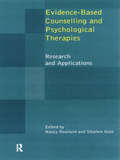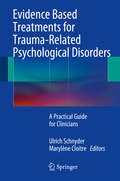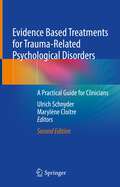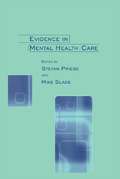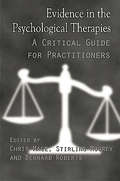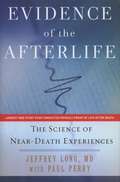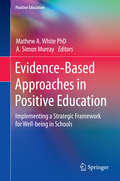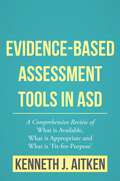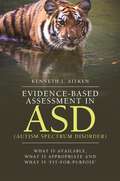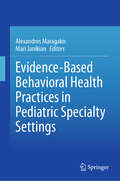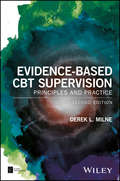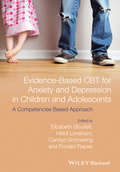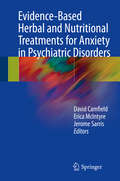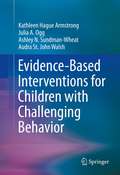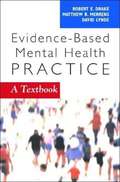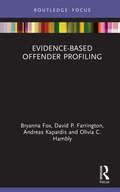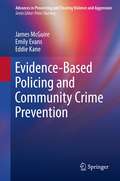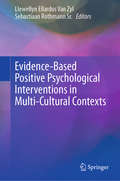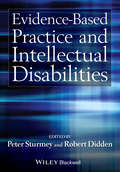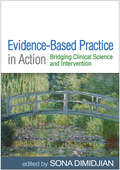- Table View
- List View
Everything in Its Place: First Loves and Last Tales
by Oliver SacksFrom the bestselling author of Gratitude and On the Move, a final volume of essays that showcases Sacks's broad range of interests--from his passions for ferns, swimming, and horsetails, to his final case histories exploring schizophrenia, dementia, and Alzheimer's.Oliver Sacks, renowned scientist and storyteller, is adored by readers for his neurological case histories, his fascination and familiarity with human behaviour at its most unexpected and unfamiliar. Everything in Its Place is a celebration of Sacks's myriad interests, all told with his characteristic compassion, erudition, and luminous prose. From the celebrated case history of Spalding Gray that appeared in The New Yorker four months before his death to reflections on mental asylums; from piercing accounts of Schizophrenia to a reminiscence of Robin Williams; from the riveting tale of a medical colleague falling victim to Alzheimer's to the cinematography of Michael Powell, this volume celebrates and reflects the wondrous curiosity of Oliver Sacks.
Everything in Its Place: First Loves and Last Tales
by Oliver SacksFrom the legendary author of The Man Who Mistook His Wife for a Hat: a volume of essays on everything from primordial life and the mysteries of the brain to the ancient ginkgo and the power of the written word. "Magical . . . [Everything in Its Place] showcases the neurologist's infinitely curious mind."—People MagazineIn this volume, Oliver Sacks examines the many passions that defined his life--both as a doctor engaged with the central questions of human existence and as a polymath conversant in all the sciences. Everything in Its Place brings together writings on a rich variety of topics. Why do humans need gardens? How, and when, does a physician tell his patient she has Alzheimer's? What is social media doing to our brains? In several of the compassionate case histories included here, we see Sacks consider the enigmas of depression, psychosis, and schizophrenia for the first time. In others, he returns to conditions that have long fascinated him: Tourette's syndrome, aging, dementia, and hallucinations. In counterpoint to these elegant investigations of what makes us human, this volume also includes pieces that celebrate Sacks's love of the natural world--and his final meditations on life in the twenty-first century.
Everything is Going to be All Right: Poems for When You Really Need Them
by VariousFrom grief to toothache, heartbreak to homesickness, the power of finding solace in the words of another cannot be overstated.Whether it was written 300 years ago or in our present day, poetry provides a comforting light in the dark. Words may not always provide solutions, but they can at the very least offer us a sense of hope, and the reassurance that we are not alone in our experiences and in our feelings.The Poetry First Aid Kit is a ready-made toolkit that offers you a light in the dark, no matter what you are feeling. Comprising poems from literary classics to new, cutting edge voices writing about the world today, this extraordinary collection proves that we are never alone in the suffering we endure, and in the human spirit's capacity to overcome.Whether you are well-versed in poetry or sceptical to the power it holds, we hope that this collection will surprise you, entertain, and ultimately offer comfort through those difficult days.Featuring poems from: Kae Tempest, Hollie McNish, Raymond Antrobus, Salena Godden, Theresa Lola, Maya Angelou, Emily Dickinson and many, many more.
Everything is Going to be All Right: Poems for When You Really Need Them
by VariousFrom grief to toothache, heartbreak to homesickness, the power of finding solace in the words of another cannot be overstated.Whether it was written 300 years ago or in our present day, poetry provides a comforting light in the dark. Words may not always provide solutions, but they can at the very least offer us a sense of hope, and the reassurance that we are not alone in our experiences and in our feelings.The Poetry First Aid Kit is a ready-made toolkit that offers you a light in the dark, no matter what you are feeling. Comprising poems from literary classics to new, cutting edge voices writing about the world today, this extraordinary collection proves that we are never alone in the suffering we endure, and in the human spirit's capacity to overcome.Whether you are well-versed in poetry or sceptical to the power it holds, we hope that this collection will surprise you, entertain, and ultimately offer comfort through those difficult days.Featuring poems from: Kae Tempest, Hollie McNish, Raymond Antrobus, Salena Godden, Theresa Lola, Maya Angelou, Emily Dickinson and many, many more.
Everything is Permitted, Restrictions Still Apply: A Psychoanalytic Perspective on Social Dislocation, Narcissism, and Post Truth
by Ian ThurstonThis book applies historicised psychoanalytic thinking in a non-reductive way to better understand the dominant emotional trends in contemporary cultural and socio-political life, with a specific focus on the relationship between social dislocation, narcissism, and "post truth". Rapid social dislocation and change are ubiquitous in late capitalist societies, though these processes may be felt unequally. Following the work of the late Christopher Lasch, Everything is Permitted, Restrictions Still Apply suggests there are powerful narcissistic trends in contemporary life mitigating against the capacity to acknowledge and face these changes; in other words, against the capacity to face reality and to mourn. There is a tendency to assert the primacy of a compelling emotional narrative over the claims of evidence and expertise, and to relate to others, past and present, as alternately idealised and/or denigrated aspects of the self. These trends permeate across socio-cultural divides and the political spectrum – underpinning phenomena as apparently divergent as free-market fundamentalism, certain forms of anti-capitalism, and contemporary identity and victim politics of both nominal right and left: movements that have more emotional and intellectual underpinnings in common than their proponents may care to admit. The contrast between liberal progressiveness and post-truth populism ignores the inter-relationship of these phenomena and begs the question of those powerful subjectivist and relativistic trends amongst sections of radical and "progressive" opinion that have long sought to problematise the very notion of truth. This book links these phenomena to contemporary social defences against facing limitation, loss, and internal conflict. More specifically it argues that in a pseudo-therapeutic culture preoccupied with narratives of victimhood, the losses associated with "traditional" manufacturing and its attendant associational cultures have neither been acknowledged nor mourned. Everything is Permitted, Restrictions Still Apply will appeal to all readers interested in history, politics, and socio-cultural analysis, and in new ways of thinking about contemporary issues. It will be of particular interest to researchers applying a psycho-social perspective on contemporary conflict and to a psychoanalytically informed readership.
Evidence Based Counselling and Psychological Therapies: Research and Applications
by Stephen Goss Nancy RowlandEvidence-Based Counselling and Psychological Therapies assesses the impact of the international drive towards evidence-based health care on NHS policy and the provision of the psychological services in the NHS. An outstanding range of contributors provide an overview of evidence-based health care and the research methods that underpin it, demonstrating its effect on policy, provision, practitioners and patients. Their thought-provoking chapters look at a variety of relevant issues including: * generating and implementing evidence * cost-effectiveness issues * practical guidelines * practitioner research Evidence-Based Counselling and Psychological Therapies is essential for mental health professionals and trainees concerned with this movement which is having, and will continue to have a huge impact on the purchasing, provision and practice of health care.
Evidence Based Treatments for Trauma-Related Psychological Disorders
by Ulrich Schnyder Marylène CloitreThis book offers an evidence based guide for clinical psychologists, psychiatrists, psychotherapists and other clinicians working with trauma survivors in various settings. It provides easily digestible, up-to-date information on the basic principles of traumatic stress research and practice, including psychological and sociological theories as well as epidemiological, psychopathological, and neurobiological findings. However, as therapists are primarily interested in how to best treat their traumatized patients, the core focus of the book is on evidence based psychological treatments for trauma-related mental disorders. Importantly, the full range of trauma and stress related disorders is covered, including Acute Stress Reaction, Complex PTSD and Prolonged Grief Disorder, reflecting important anticipated developments in diagnostic classification. Each of the treatment chapters begins with a short summary of the theoretical underpinnings of the approach, presents a case illustrating the treatment protocol, addresses special challenges typically encountered in implementing this treatment, and ends with an overview of related outcomes and other research findings. Additional chapters are devoted to the treatment of comorbidities, special populations and special treatment modalities and to pharmacological treatments for trauma-related disorders. The book concludes by addressing the fundamental question of how to treat whom, and when.
Evidence Based Treatments for Trauma-Related Psychological Disorders: A Practical Guide for Clinicians
by Ulrich Schnyder Marylène CloitreThe second, completely updated edition of this book offers an evidence based guide for clinical psychologists, psychiatrists, psychotherapists and other clinicians working with trauma survivors in various settings. It provides easily digestible, up-to-date information on the basic principles of traumatic stress research and practice, including psychological and sociological theories as well as epidemiological, psychopathological, and neurobiological findings. However, as therapists are primarily interested in how to best treat their traumatized patients, the core focus of the book is on evidence based psychological treatments for trauma-related mental disorders. The full range of trauma and stress related disorders is covered, including Acute Stress Reaction, Complex PTSD and Prolonged Grief Disorder, reflecting important anticipated developments in diagnostic classification. Each of the treatment chapters begins with a short summary of the theoretical underpinnings of the approach, presents a case illustrating the treatment protocol, addresses special challenges typically encountered in implementing this treatment, and ends with an overview of related outcomes and other research findings. Additional chapters are devoted to the treatment of comorbidities, special populations and special treatment modalities and to pharmacological treatments for trauma-related disorders. A novel addition is the chapter on Innovative interventions to increase global mental health. The book concludes by addressing the fundamental question of how to treat whom, and when.
Evidence in Mental Health Care
by Mike Slade Stefan PriebeMental health care increasingly faces a challenge to be 'evidence based'. However, despite much policy activity in the UK, it's still not clear what sort of evidence researchers should be producing for mental health services, or what purchasers should be looking for. Evidence in Mental Health Care evaluates a range of different research methodologies and types of 'evidence', and includes: * a historical and conceptual analysis of what was regarded as evidence in the past, and what impact it has had in mental health care* a presentation of different methodological approaches, and a discussion of their strengths and weaknesses in providing evidence* how evidence is applied in different treatment and care modalities* different angles on the way forward for providing appropriate evidence to improve current mental health care. Evidence in Mental Health Care will prove vital for the successful extension of evidence-based evaluation to mental health services in general. It will be essential reading for researchers, students and practitioners across the range of mental health disciplines, health service managers and purchasers of services.
Evidence in the Psychological Therapies: A Critical Guidance for Practitioners
by Stirling Moorey Bernard Roberts Chris MaceEvidence-based practice is likely to determine standards for publicly and insurance-funded psychotherapies in the near future. How should practitioners prepare themselves for this?Evidence in the Psychological Therapies takes a critical look at the meaning of evidence. It examines which kinds of evidence are most relevant to psychological therapies, and Mow the quality of evidence can be assessed. The potential impact of evidence on practice is illustrated across a range of clinical settings and therapeutic models. The contributors include distinguished academics in law and philosophy, clinical researchers who have contributed to the evidence base for psychological therapies, and prominent therapists who have put research into practice and pioneered effective methods of audit.This accessible discussion of a topic no practitioner can ignore is recommended to all psychotherapists, including psychoanalysts, CBT therapists, psychiatrists, clinical psychologists, counsellors and those in training.
Evidence of the Afterlife: The Science of Near-death Experiences
by Paul Perry Jeffrey LongBack Cover: "In Evidence of the Afterlife, radiation oncologist Jeffrey Long presents the findings of the Near Death Experience Research Foundation (NDERF) and shares firsthand accounts of those people who have died and lived to tell about it. According to Long, 'Near-death experiences (NDEs) are real. Experiencers frequently report seeing or hearing events while unconscious, often geographically distant from their body. No physiological or psychological explanation of NDEs can account for this. There is currently more scientific evidence to the reality of NDEs than there is for how to effectively treat certain forms of cancer.' Dr. Long breaks down his evidence into nine categories, such as the remarkable consistency of the details of NDEs around the world, the accuracy of the life reviews that occur during NDEs, and the transformational effect these experiences have on the lives of those who have them. Long concludes that we now possess the most compelling evidence for life beyond death ever compiled."
Evidence-Based Approaches in Positive Education
by Mathew A. White A. Simon MurrayBased on action research and implementation at one of the world's great schools, this book provides a much-needed exploration of how to implement positive education at a whole school level. Evidence-Based Approaches in Positive Education summarises the integration of a whole-school mental health and well-being strategy, positive psychology programs and pastoral care models from 3 - 18 years of age. Positive education is the teaching of scientifically validated programs from positive psychology and character education that have an impact on student and staff well-being. It is an approach that focuses on teaching, building and embedding social and emotional learning throughout a student's experience. St Peter's College - Adelaide is the only institution in the world to integrate Martin Seligman's well-being theory throughout all aspects of both its strategic intent and positive education programs. The School's vision is to be a world-class school where all boys flourish. Its mission is to provide an exceptional education that brings out the very best in every boy. This is done within an intellectually and spiritually rich environment that nurtures international-mindedness, intercultural understanding, respect and a commitment to social justice. This book captures the developments of the St Peter's College journey. It focuses on the integration of well-being across seven strategic goals: Academics; Well-being; Student Life; Entrepreneurship; Innovation and Partnerships; People, Culture and Chan≥ Sustainability and Environment; Community Engagement, Advancement, and Philanthropy. A uniquely Australian school, the impact of a St Peter's College education is to build great men: who believe safety, service and integrity and fundamental parts of their lives; who are active members of communities that are socially and culturally diverse; who engage in political, ethical, and environmental challenges as good citizens. Since 1847, St Peter's College alumni have had global and life-changing impact in all fields of human endeavour. The School's alumni include three Nobel Laureates, 42 Rhodes Scholars, Olympians and Archbishops, artists and scientists, educators and journalists, actors and politicians, philanthropists and physicians, CEOs, diplomats and soldiers, explorers, painters and poets. This book shares evidence-based practices and makes a substantial contribution to the rapidly developing field of positive psychology and its application in schools.
Evidence-Based Assessment Tools in ASD: A Comprehensive Review of What is Available, What is Appropriate and What is 'Fit-for-Purpose'
by Kenneth AitkenThis cutting-edge resource provides a comprehensive review of available assessment tools for Autism Spectrum Disorder (ASD), presenting up-to-date evidence for their efficacy as well as best practice for selecting appropriate forms of assessment across the lifespan. Gathering together the latest international research evidence, Kenneth J. Aitken provides a clear evaluation of the commonly used assessment measures, and examines other tools not yet validated for ASD assessment but which are likely to have promising applications for the field. The tools covered include those relating to core assessment areas, such as cognitive ability, communication, motor skills and executive function, as well as supplementary and emerging areas of assessment, such as behaviour and attention, sensory issues, anxiety and depression, friendships and loneliness, and internet safety. This pioneering report will be an indispensable primary reference for researchers, academics, clinicians, service providers and commissioners.
Evidence-Based Assessment in ASD (Autism Spectrum Disorder): What Is Available, What Is Appropriate and What Is ‘Fit-for-Purpose’
by Kenneth AitkenAdvocating for an increased emphasis on evidence-based practice, this book describes and analyses a wide range of available Autism Spectrum Disorder (ASD) assessment measures. The author offers guidance on how to evaluate services and programmes and how to recognise which will be most effective in different scenarios for people with differing needs. A wide range of measures are reviewed in detail, including assessments used in situations often ignored in overviews relevant to ASD, such as assessments of internet addiction, response to traumatic stress, and criminal offending risk and witness credibility. This book is an invaluable resource to professionals who support people with ASDs, including social workers and teachers, and who are under increasing pressure to reliably assess which services, programmes and therapies are effective and fit-for-purpose.
Evidence-Based Behavioral Health Practices in Pediatric Specialty Settings
by Alexandros Maragakis Mari JanikianAs the field of behavioral health continues to evolve beyond the confines of traditional outpatient office settings, there is a growing need for providers who are adept at delivering evidence-based services across various specialty environments. This need is particularly pronounced when it comes to pediatric populations, where the consequences of unidentified or untreated behavioral health issues can be severe and long lasting. Recognizing these challenges, this book edition aims to facilitate workforce and skills development for professionals working in multiple specialty settings where pediatric behavioral health concerns frequently arise. The text will serve as a comprehensive resource for supervisors and trainees, emphasizing a discrete skill and competency-based approach tailored to the unique demands of each setting. By focusing on the development of specific competencies, the text will ensure that providers are equipped to address the diverse needs of pediatric patients effectively. This includes settings such as schools, hospitals, primary care clinics, and community-based programs, where early identification and intervention are crucial. In schools, for example, behavioral health providers need to be proficient in collaborating with educators and understanding the educational impacts of behavioral health issues. They must also be skilled in implementing school-wide interventions and working directly with students who exhibit behavioral or emotional difficulties. In hospital settings, providers must be prepared to address the complex interplay between physical and mental health, often working as part of a multidisciplinary team to provide holistic care to young patients. Primary care clinics represent another critical setting, where behavioral health concerns are often first identified. Providers in these environments need to be skilled in integrating behavioral health services into routine medical care, conducting screenings, and offering brief interventions. Community-based programs, on the other hand, require providers to engage with diverse populations, often in under-resourced areas, necessitating a high degree of cultural competence and adaptability. Overall, this text will highlight the importance of specialized training and continuous professional development to meet the evolving needs of pediatric populations in various specialty settings. By promoting a competency-based approach, it will empower providers to deliver high-quality, evidence-based care, ultimately improving outcomes for children and adolescents facing behavioral health challenges.
Evidence-Based CBT Supervision: Principles and Practice (BPS Textbooks in Psychology)
by Derek L. MilneNew edition of a distinctive guide to clinical supervision, for all who work in the mental health field Evidence-Based CBT Supervision offers an evidence-based perspective of particular interest to CBT supervisors working within mental health. It integrates the author’s extensive professional experience with relevant theories, empirical knowledge derived from the latest research, and guidance from other leaders in the field. First published as Evidence-Based Clinical Supervision, the Second Edition puts the emphasis more firmly on a cognitive-behavioral approach, clarifying as never before a CBT orientation to the subject. It also incorporates more information on the restorative function of supervision (supporting supervisors emotionally), and draws on findings and methods for developing professional expertise. Founded on the author’s long-term involvement in painstaking programmatic research, this book offers an original, scholarly, systematic, and constructive guide for fostering evidence-based supervision in mental health care. It features a manual with video demonstrations and supervision guidelines, and includes many useful ideas and recommendations for all those involved in supervision, not just trainers and supervisors. The author also spells out how the evidence base informs his companion book, the more practical and training-focused Manual for Evidence-Based CBT Supervision (Milne & Reiser, 2017). Bringing applied science to supervision, Evidence-Based CBT Supervision offers an expert’s guide to the critical business of making clinical supervision work within modern mental health services.
Evidence-Based CBT for Anxiety and Depression in Children and Adolescents: A Competencies Based Approach
by Elizabeth S. Sburlati Heidi J. Lyneham Ronald M. Rapee Carolyn A. SchnieringEvidence-Based CBT is the first book to take an explicitly competencies-based approach to the cognitive-behavioural treatment of anxiety and depression in children and young people. It draws on top-name expertise to define and demonstrate the therapist competencies needed to effectively implement CBT.
Evidence-Based Herbal and Nutritional Treatments for Anxiety in Psychiatric Disorders
by David Camfield Erica Mcintyre Jerome SarrisThis book presents the current clinical evidence on the efficacy of herbal and nutritional treatments for anxiety that is experienced in association with psychiatric disorders, and explains how health professionals can apply this knowledge to the benefit of patients presenting with a wide range of symptoms, including comorbid mood disorders. All chapters are written by world-leading researchers who draw on the findings of human clinical trials to provide uncompromising assessments of individual treatments, including herbal anxiolytics with sedative actions, adaptogens, cognitive anxiolytics, and nutraceuticals. Traditional treatments requiring further study - including the plant-based psychotropic Ayahuasca and other phytotherapies of potential value in the treatment of anxiety - are also reviewed. In the closing chapters, a series of helpful case studies are provided by mental health clinicians in order to illustrate how herbal and nutritional treatments can best be integrated into an overall treatment plan for individuals with a range of comorbid diagnoses. Mental health professionals, researchers, and general readers will find that the book provides an excellent review of current scientific knowledge gained from the study of herbal and nutritional treatments, together with important clinical recommendations for their use in patients experiencing clinically significant levels of anxiety.
Evidence-Based Interventions for Children with Challenging Behavior
by Audra St. John Walsh Kathleen Hague Armstrong Julia A. Ogg Ashley N. Sundman-WheatWhen a child has difficulties eating or sleeping, or throws frequent tantrums, many parents cross their fingers and hope it's a phase to be outgrown soon. But when they persist, challenging behaviors can follow children to school, contributing to academic problems, social difficulties, and further problems in adolescence and adulthood. The authors of Evidence-Based Interventions for Children with Challenging Behavior take a preventive approach in this concise, well-detailed guide. Offering best practices from an extensive Response to Intervention (RTI) evidence base, the book provides guidelines for recognizing the extent of feeding, sleeping, toileting, aggression, and other issues, and supplies successful primary, secondary, and tertiary interventions with rationales. Case examples integrate developmental theories and behavior principles into practice, illustrate how strategies work, and show how to ensure that parents and caregivers can implement them consistently for maximum effect. Progress charts, content questions, and other helpful features make this an invaluable resource for students and professionals alike. Included in the coverage: The prevention model and problem solving.Screening techniques.Evidence-based practices with children and their caregivers.Behavior principles and their application.Monitoring progress and evaluating outcomes.Plus helpful appendices, resource links, and other learning tools. Evidence-Based Interventions for Children with Challenging Behavior is an essential text for graduate students, scientist-practitioners/professionals, and researchers in child and school psychology; assessment, testing and evaluation; occupational therapy; family; educational psychology; and speech pathology.
Evidence-Based Mental Health Practice: A Textbook
by Robert E. Drake Matthew R. Merrens David W. LyndeThis book explores some of the complex challenges in implementing EBPs, and highlights the meaningful opportunities that are inherent in this paradigm shift.
Evidence-Based Offender Profiling (Criminology in Focus)
by David P. Farrington Andreas Kapardis Bryanna Fox Olivia C. HamblyOffender profiling is an investigative tool used to narrow down the range of potential suspects for a crime by predicting the personality, behavioral, and demographic characteristics that an offender is likely to possess, based upon information collected at the crime scene. While offender profiling has been popularized by TV shows and movies such as Criminal Minds, Silence of the Lambs, and Mindhunter, the real-world impact of offender profiling is largely unknown. This book discusses the history of offender profiling, summarizes research on offender profiling methods, and reviews offender profiling evaluations of accuracy and applied impact. This book also describes a promising new offender profiling methodology called evidence-based offender profiling. This new method relies upon empirical data and scientific methods to develop, evaluate, and replicate offender profiles, thereby increasing offender profiling’s accuracy and utility for active police investigations. It uses prior information about statistical regularities between types of offenders and types of offenses to predict the characteristics of offenders in unsolved cases. A discussion of the future of offender profiling research and implications for law enforcement is also included. This book also explains how practitioners can benefit from the use of empirically tested and validated profiles in their unsolved investigations and how the use, continued research, and evaluation of evidence-based offender profiling can advance the quality, prestige, and utility of the field of offender profiling.
Evidence-Based Policing and Community Crime Prevention (Advances in Preventing and Treating Violence and Aggression)
by Emily Evans James McGuire Eddie KaneThis book addresses and reviews progress in a major innovative development within police work known as evidence-based policing. It involves a significant extension and strengthening of links between research and practice and is directed to the task of increasing police effectiveness in the field of community crime prevention. This volume provides an international perspective that synthesizes recent research results from the United States and other countries – including systematic reviews of large bodies of evidence – to illuminate several of the most challenging issues currently confronting police departments. It examines recent advances in research-based models of policing and the expanding base in outcome evaluation.Key areas of coverage include:Managing the nighttime economy.Supervising sex offenders.Tackling domestic/intimate partner violence.Addressing school violence and the formation of gangs.Reducing victim and witness retraction and disengagement.Responding to mental disorders, safeguarding vulnerable adults, and providing victim support.Leveraging public awareness campaigns.In addition, each chapter presents an overview of key issues within a designated area, synthesizes existing reviews, and examines the most recent research. The book clearly and concisely presents major concepts, theories, and research findings, thereby providing both conceptual and analytic tools alongside an integrated presentation of principal findings and messages. The volume concludes with a discussion of current directions in research, key developments in policing strategies, and identification of effective operational structures for facilitating and sustaining research-practice links.Evidence-Based Policing and Community Crime Prevention is a must-have resource for researchers, clinicians and other professionals, and graduate students in forensic psychology, criminology and criminal justice, public health, developmental psychology, psychotherapy and counseling, psychiatry, social work, educational policy and politics, health psychology, nursing, and behavioral therapy/rehabilitation.
Evidence-Based Positive Psychological Interventions in Multi-Cultural Contexts
by Llewellyn Ellardus Van Zyl Sebastiaan Rothmann Sr.This volume presents clearly defined and described evidence-based positive psychology interventions (PPIs), which have been validated in multi-cultural contexts. It discusses validated PPIs which have been shown to have a significant impact in both clinical and real-world settings. From the late 1990s, there has been an upsurge in popular psychological “self-help” publications drawing from processes and principles of positive psychology. These publications are based on clinically validated PPI studies and translated in a “consumer friendly” manner. However, in these popular works the intervention methods are significantly altered from the original forms, and the contexts of the consumers are meaningfully different from those of the original study populations, the impact on outcome variables are often misinterpreted or over-inflated, and incorrect outcome variables are targeted. Original research articles also do not extensively discuss the content of the interventions, but merely present short descriptions of the PPI. As such, the intervention content cannot accurately be translated into practice. Hence, the need for this volume which discusses in depth how validated PPIs in various multi-cultural contexts work in both clinical and real-world settings.
Evidence-Based Practice and Intellectual Disabilities
by Peter Sturmey Robert DiddenEvidence-Based Practice and Intellectual Disabilities responds to the recent increased focus on, and need for, the use of evidence-based practice (EBP) in treating intellectual disabilities.The first book wholly dedicated to addressing EBP specifically in relation to intellectual disabilitiesProvides clinical guidelines based on the strength of evidence of treatments for a given problematic behavioral topography or disorderHighly relevant to a wide-ranging audience, including professionals working in community services, clinicians and parents and carers
Evidence-Based Practice in Action: Bridging Clinical Science and Intervention
by Sona DimidjianA growing number of empirically supported treatments are available to mental health practitioners, yet evidence-based practice requires knowledge and skills that are often overlooked in clinical training. This authoritative reference and text grounds the reader in the concepts, rationale, and methods of evidence-based practice. Clinicians and students are guided to consult and evaluate the research literature, use data to inform clinical decision making, consider the role of culture and context, craft sound case formulations, monitor progress and outcomes, and continuously develop their expertise. Of particular utility, the book includes rich, chapter-length case studies. Leading proponents of cognitive-behavioral therapy, dialectical behavior therapy, behavioral activation, and other approaches make explicit the ways they draw on evidence throughout the process of assessment and treatment.




